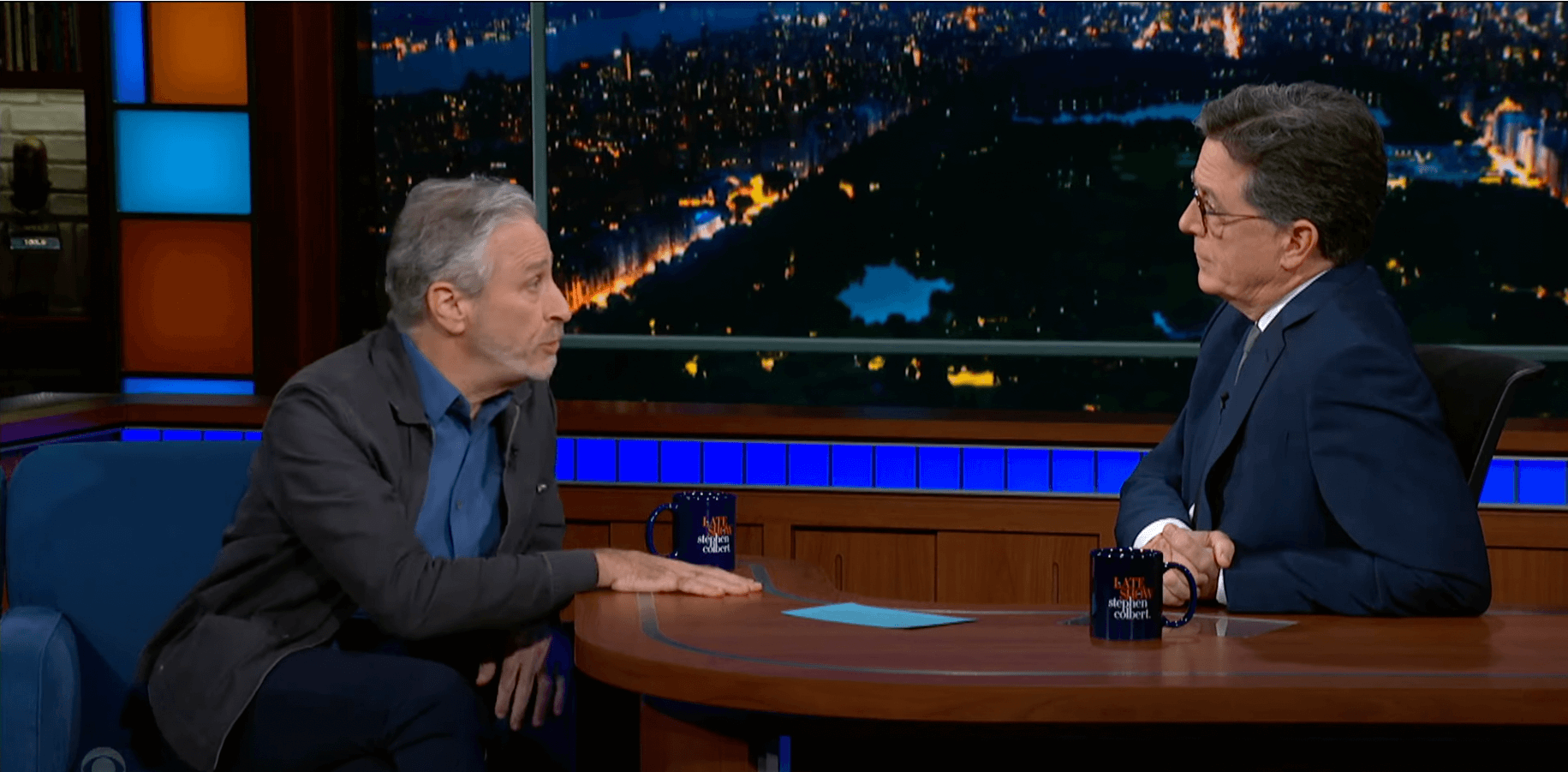Jon Stewart is right about how to fight antisemitism — and should maybe be our ‘spokesjew’
The comedian gave a sober (if funny) analysis of the frenzy surrounding Kyrie Irving, Kanye West and Dave Chappelle

Jon Stewart gave a funny, perceptive analysis of recent antisemitism scandals on “The Late Show with Stephen Colbert.” Image by YouTube
Tuesday on “The Late Show,” Jon Stewart sat down with his old friend Stephen Colbert to talk Kyrie Irving, Kanye West and Dave Chappelle’s “SNL” monologue. In jest, he referred to himself as our “spokesjew.” His read of the situation has me thinking that such a role should exist — and maybe he should inaugurate it.
Starting with humor, Stewart defused the absurdity of antisemitic myths by steering right into them.
“I’m not on all the committees, and I don’t know who ended Kanye’s Adidas deal,” Stewart said. “I’m on oil prices and bagel flavors.” (Blueberry bagels were the work of a “rogue committee.”)
Later, he pivoted to a clear-eyed analysis of the best way to combat tropes of Jewish control: not by forcing an apology tour or silencing any murmurs of conspiracy, but by having frank and public discussions.
“Penalizing somebody for having a thought, I don’t think it is the way to change their minds or gain understanding,” Stewart said, addressing Kyrie Irving’s suspension. “This is a grown-ass man. And the idea that you would say to him, ‘We’re gonna put you in a timeout. You have to sit in the corner and stare at the wall until you can no longer believe that the Jews control the international banking system.’ Like, we have to get past this in the country.”
Addressing his old friend Dave Chappelle’s monologue, Stewart dismissed concerns from acquaintances who told him it “normalized antisemitism.”
“I don’t know if you’ve been on comment sections on most news articles, but it’s pretty f—g normal,” Stewart said.
Predictably, Stewart and Colbert agreed that censoring comedians was not the way to go, with Stewart further elaborating that reflexively labeling a belief or comment “antisemitic” isn’t helpful. What was instructive, was something West said after his “death con 3” tweet.
“He said, ‘hurt people hurt people,’” Stewart said of West. “And if the point of all this is then to heal people, the only way to heal the wound is to open it up and cleanse it and that stings, that hurts, but you have to expose it to air.”
This means not only grappling with the antisemitic belief, but why it may have taken root.
“Look at it from a Black perspective,” Stewart said. “It’s a culture that feels that its wealth has been extracted by different groups. … Whether it’s true or not, isn’t the issue. That’s the feeling in that community. And if you don’t understand where that’s coming from, then you can’t deal with it and you can’t sit down with them and explain that being in an industry isn’t the same as having a nefarious, controlling interest in that industry and intention.”
(Obviously that “feeling” of extracted wealth is a historical fact for Black people, but I get Stewart’s point.)
Stewart believes that shutting down the discourse, failing to sufficiently explain why certain tropes are harmful or finding the legitimate reasons why they may convince some people, creates the perfect conditions for these beliefs to thrive.
“If we all just shut it down, then we retreat to our little corners of misinformation, and it metastasizes and the whole point of all this is to not let it metastasize,” Stewart said.
He’s right. While an antisemite may not be convinced that the Christian monopoly on the presidency debunks the myth of Jewish control (the whole idea is that we’re sorta behind the scenes installing candidates who won’t raise suspicion), the premise that more candid discussion is the way out of this feels right. It’s not perfect, but the current way of doing things (invitations to meet with rabbis, the ADL or visit a Holocaust Museum) isn’t exactly working, and may even backfire in some cases.
I think that Stewart, who effectively lobbied Congress on behalf of 9/11 first responders and who is one of the only people to effectively flabbergast Tucker Carlson on air (albeit way back in 2004), could be an effective “spokesjew” for the movement of frank discussion going forward. (Though maybe he should clear the air with Wyatt Cenac a bit more before he assumes the post, and definitely involve Jews of color in his work.)
A comedian taking on a leadership role will almost certainly reinforce stereotypes — but Jews being funny is a pretty benign one.

















